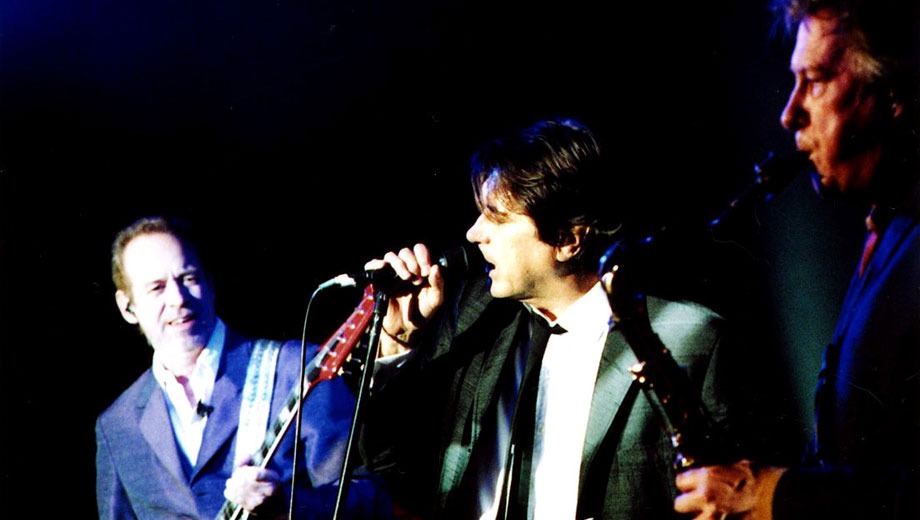
If you filled a bill with all the artists whose work bears the fingerprints of Roxy Music, you’d have the festival to end them all. The show would start with their countless fellow travellers and courtiers in experimental rock of the early 1970s, take in some of the prime players in Krautrock, just about all of the protagonists of the new romantic movement, the gatekeepers of electronica and progressive dance music, and open out into a millennnial rock hall of fame with the likes of Radiohead, Pulp, Moby, Franz Ferdinand and many more.
Having returned in 2001, satisfying endless speculation and voracious interest, Roxy Music took to the road for a critically acclaimed World Tour. Their first live performances together since 1983, the band was based around the classic line-up of vocalist Bryan Ferry, guitarist Phil Manzanera and saxophonist Andy Mackay with the great Paul Thompson on drum.
Watching the reconnection of these truly original spirits of British music, reinvestigating the priceless Roxy catalogue after almost two decades, was fascinating and thrilling. Since they quit (uniquely, in rock convention, while they were ahead) at the conclusion of a North American tour 18 years ago, the band’s three core members have pursued diverse career paths but stayed faithful to the adventurous guile that made Roxy Music such a potent cocktail of fashion, romance, nostalgia and futurism. From their earliest steps, Roxy left a massive footprint on British popular culture. They were formed in 1971 by Ferry, Mackay and Brian Eno, the axis completed with Manzanera’s official arrival early next year, by which time the music press was buzzing. Their self-titled debut album in the summer of ‘72—declared by many then and ever since as the best first album ever—cleared the path for a saunter into the UK top five by the ravishingly stylish first single ‘Virginia Plain’. Before the year ended, Roxy had completed their opening tours of both the UK and US. For once, fans in the industry and in the real world were unanimous: here was a triumph of style AND substance.
Almost everything that happened chez Roxy during the next decade, and seven more studio albums, has become part of the fabric of rock history, from rule-trashing singles like ‘Pyjamarama’, Street Life’ and ‘Love Is The Drug’ to Bryan’s ever-influential wardrobe and those legendary album covers. Three times they topped the album charts during their active lifetime, with 1973’s ‘Stranded’, 1980’s ‘Flesh and Blood’ and their last studio album ‘Avalon’, and it wasn’t long before the compilation album ‘Street Life’ raced to No.1 in 1986 and stayed there five weeks.
The remastered reappearance of the entire Roxy catalogue in 2000, coupled with the rapturous reviews, which the 2001 World Tour engendered, confirmed that the legacy had only appreciated with time. Critics were unanimous in their unequivocal praise: “..literally inimitable”, “consistently cited as influential by modern heroes”, “the experience is more like re-reading a good book”, “..received an ecstatic response from the crowd”, “you forget that they ever went away”.” wonderful art rock and pop”, “Roxy Music surprising us again.” Ferry’s 1999 solo album “As Time Goes By’ gained significant recognition with a Grammy 2001 nomination.
In 2005 Roxy Music played a stunning set at the Isle of Wight Festival, followed by festival dates in Europe, the following Summer and a performance at Live 8’s Berlin concert.
For all the imitators and admirers, no one has ever successfully cloned the unique and unknowable combination of elements that comprised Roxy Music. Three decades later take your partners: it’s time, again, to do the strand.

